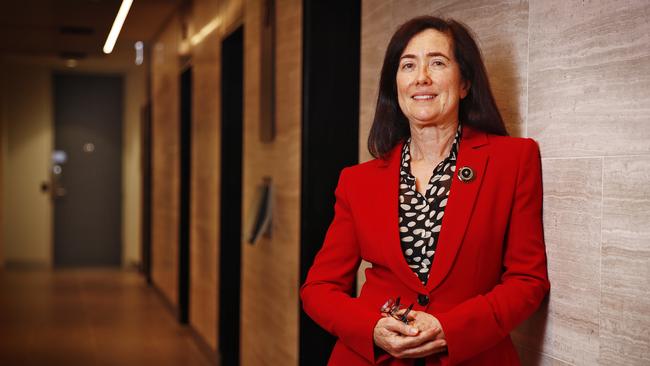Brookfield’s $20bn-$30bn renewable energy plan for Origin
Brookfield has won over the competition regulator with a bold green pledge. Now it faces hurdles to deliver.

The competition regulator’s approval of the $18.7bn takeover bid for energy retailer Origin has thrown a spotlight on the bold promises of a $20bn-$30 bn renewable energy roll-out in Australia by Canadian investment giant Brookfield.
Giving the greenlight to the proposal by Brookfield - a Canadian global asset manager with some $US850bn in assets under management - and co-investor US LNG company MidOcean, Australian Competition & Consumer Commission chair Gina Cass-Gottlieb made it clear that the proposed renewable energy “build out” was the key to its approval of the deal.
“The ACCC considers that the acquisition will likely result in an accelerated roll out of renewable energy generation, leading to a more rapid reduction in Australia’s greenhouse gas emissions,” she said.
Brookfield’s promises were enough to offset the watchdog’s admitted concerns about the deal involving a potential lessening of competition in the energy sector, given that Brookfield already has a key 45.4 per cent stake in AusNet which owns the majority of the Victorian high voltage electricity transmission system.
Australia’s fourth largest emitter of greenhouse gas, Origin owns 13 per cent of the electricity generation capacity of the national electricity market.
One of Australia’s three largest energy retailers, Origin owns and operates Australia’s largest coal fired power station – the Eraring Power station in NSW.
The future of the power station is currently under review.
Origin had indicated it could close it as early as August 2025 but it now says it has not yet made a final decision on the timing and is continuing to engage with the NSW Government over the issue.
Brookfield’s “green build out”, as it is calling it, involves an investment of 14 gigawatts of renewable energy generation and storage capacity by 2033 – well above Origin’s current planned target of 4 GW in renewables by 2030.
Brookfield is planning to buy Origin through its Brookfield Global Transition Fund (BGTF), launched in 2021, with a mandate to invest billions of dollars in renewable energy.
Led by former Bank of England and Bank of Canada governor, Mark Carney, BGTF has raised $US15 bn, and is now the world’s largest private institutional investment fund focusing solely on investing in the global transition to renewable energy.
As well as being bound by its commitment to the ACCC for the roll out, Brookfield is arguing that it is bound by its fiduciary commitments to investors in the megafund to deliver on its commitment to green energy including through the Origin deal.
Brookfield is arguing that the acceleration of renewables development – 10 gigawatts over and above business as usual will make a “material difference” to achieving Australia’s net zero targets, at a time when analysts are questioning whether the Albanese Government’s 82 per cent renewable energy target for 2030 can be met.

In an interview with The Australian, the ACCC chair said the approval did not involve any enforceable undertaking on Brookfield.
“Brookfield has internal governance arrangements requiring them to regularly measure and report to investors against specific impact targets for the renewables build out and Paris aligned emissions reduction targets,” she said.
“We do not have an enforceable undertaking that they must build out in accordance with their proposed plan.
“But we considered the plan was a sufficient basis to be confident that it’s likely because of those strong commercial and financial incentives.”
In its submissions to the ACCC, Brookfield argues that its plan for Origin has been approved by its investment committee with an expected return over the life of the fund.
It argues that it can deliver on its promises given its expertise in the renewable energy field and its access to capital.
But, in approving the deal, the ACCC pointed out that delivering on its promises may not be as easy as it believes.
It says constraints in the electricity transmission, particularly in the short term, may delay its ability to build renewable energy generation at the speed claimed.
But it says despite this it is still likely to increase the speed of the green energy roll out in Australia, a result which Ms Cass-Gottlieb described as “a public benefit of considerable weight.”
In its submissions to the ACCC, Brookfield says Origin’s energy markets business is the “ideal platform for renewables investment.”
Brookfield’s plans for Origin include closing Eraring “as soon as possible, provided that there is sufficient replacement capacity such that doing so will not pose risks to system stability”, it says in its latest ACCC submission.
It promises to “work closely with the NSW Government to ensure closure does not adversely affect grid stability or reliability.”
But it admits that its ability to close Eraring will depend on the development of new renewable energy transmission capacity in NSW, the commissioning of the Snowy 2.0 project which has been subject to considerable delays and the development of new hydro projects in the state.
One of the world’s largest investors in renewable power and climate transition assets, Brookfield has some 25GW of generating capacity.
Its proposed investment, which represents a fifth of the total renewable energy capacity required to be developed across the national electricity market through to 2030, comes at a time when it is becoming increasingly apparent that the Federal Government’s renewable energy target will not be met.
Brookfield’s ACCC submissions contain supporting arguments from the ANZ and the Commonwealth Bank supporting its bid.
The ANZ’s submission says the proposed acquisition will “bring considerable ambition, expertise and capital which will assist in driving the ongoing transformation of the national energy market at a critical juncture.”
The CBA submission says that the deal “creates an incentive for an investor of the size, capability and credibility of Brookfield to opt to invest in renewables in Australia in a meaningful manner, notwithstanding opportunities to invest elsewhere in the world.”
“The scale of the commitment to decarbonise a company in a carbon intensive industry sets a high bar and potentially forges a path for others.”
But as Brookfield and the ACCC both acknowledge, while it is committed to its mega billion dollar green energy roll out, its bold plan faces obstacles which may be outside its ability to influence.
Additional reporting by Colin Packham.





To join the conversation, please log in. Don't have an account? Register
Join the conversation, you are commenting as Logout